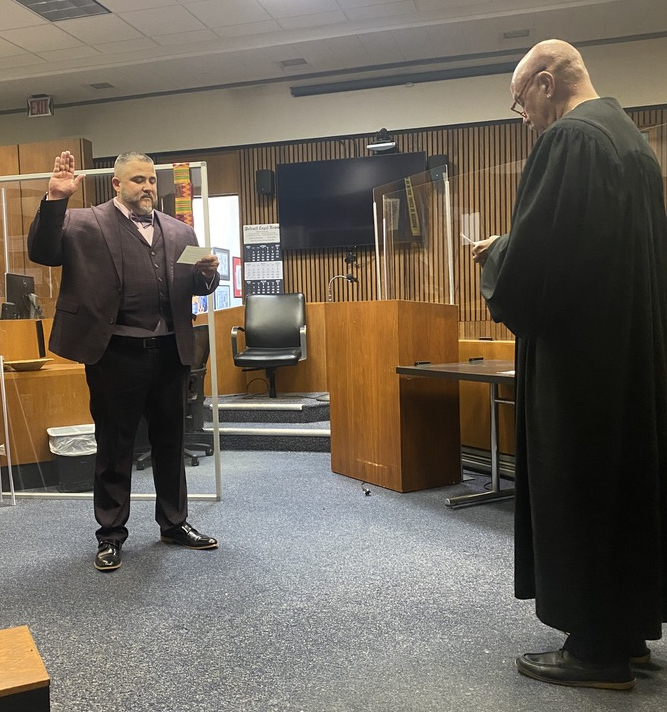
This repost from May 19 is the first in a daily countdown of 10 articles from this year.
Edward Martell met Wayne County Circuit Judge Bruce Morrow in a place no young man wants to be: Standing in his courtroom, utterly at his mercy.

Edward Martell, newly minted lawyer (Photo: Nancy Derringer)
It was 2005, and Martell, a 27-year-old high-school dropout from Inkster with no plan for his life other than continuing to sell drugs, was in a very vulnerable position. Out on bail from one arrest in Romulus, he’d been snared by another drug sting in Dearborn Heights. He was looking at prison time, 1 to 20 years of it, for delivery and manufacture of crack cocaine.
“Any other judge would have flushed me,” he said.
Judge Morrow had other plans. He gave Martell three years’ probation and a chance to make something of himself before it was too late.
“He said, ‘I challenge you to be a CEO of a Fortune 500 company instead of being out here selling drugs,’” Martell recalled. “And I love a challenge.”
Today, Martell isn’t the CEO of a Fortune 500 company. But he did earn a full scholarship to college and another to law school. He passed the exams, and in May raised his right hand to be sworn in as a member of the Michigan Bar, in the courtroom of the judge who spared him, and who also administered the oath.
“That was better than walking your daughter down the aisle,” Morrow said.

Judge Morrow
Today, at 43, Martell sits in the conference room at Perkins Law Group in downtown Detroit, looking every inch an esquire, in a black suit, French cuffs and a sizable gold wristwatch. It’s a world away from what he favored as a young man, but then, so is he.
Martell’s departure from the straight and narrow as a teenager is a familiar one. Growing up with a single mother, he said he was “raised with high morals and ethics,” but fell to temptation and started getting in trouble around age 13.
Bounced in and out of juvenile court and one stretch in detention, he dropped out of school at 17, left home and “became intertwined with the drug culture.” It had its rewards, but by the time Morrow issued his challenge, Martell had seen enough of the bad stuff that he wanted out. He completed his three years’ probation, got a GED and in the fall of 2008 enrolled at Wayne County Community College, at 31.
“They asked what I wanted to study, and I said I want to be a lawyer,” Martell remembered. “They laughed at me. They said with your background you should go into heating and cooling.”
But he persisted, and his counselor finally gave in, telling him to start with the prerequisite courses for higher ed and they’d both see how it went. It took three years to finish, but at the end he had an associates degree.

Martell is sworn in to the State Bar of Michigan by Wayne County Judge Bruce Morrow (Courtesy photo)
The next step was four-year college. He chose the University of Detroit Mercy because they offered the most scholarships. He applied for and won one of five Jesuit Founders’ Scholarships, offering full tuition. He studied pre-law, political science and Spanish, and graduated in 2014. He chose Detroit Mercy for law school, again because of the scholarships, and again won a full ride.
A big gamble
But all this time, a sword dangled over his head by a thread – his criminal record. To be admitted to the Michigan Bar, a candidate must pass a character and fitness review. While a criminal record isn’t immediately disqualifying, Martell’s was long and involved drug trafficking and admitted drug abuse.
“I was chasing a dream with no guarantees,” he said. “My application” – which explained the circumstances and consequences of his checkered past – “was 1,200-plus pages.”
The State Bar of Michigan, in its website’s section on the character and fitness review, notes, “An applicant’s candor throughout the character and fitness process is often the most telling indicator of the applicant’s current fitness to practice law.” So when an initial review raised questions about his past drug use, even though he said he hadn’t touched drugs in years, Martell enrolled in an outpatient treatment program. He met with the counselors, did the work and finished the whole course.
At his final hearing, Morrow testified on his behalf, as did his colleagues at Perkins Law Group, where he was already employed doing legal research and writing. When he got final approval, “I sobbed like a baby,” Martell said. His lawyer passed him his own handkerchief, which Martell intends to frame and hang in his new, larger, no-longer-support-staff office. The practice specializes in criminal law, and so will Martell, but he's interested in election law as well.
He hopes his experience will help him with future clients in situations much like his own turning point.
"I think my testimony may provide some of these young men and women with some motivation," Martell said. "You plant a seed, and hope it will grow."
Morrow, whose mercy set this career in motion, quotes Motown sages the Velvelettes, who sang, “Everybody needs love.”
“It’s a crazy cliché, but some defendants, that’s what they need, too,” said Morrow. “If you believe like I believe, that there but for the grace of God go you and me... It took some intelligence to get in and out of the kind of trouble he got into. I told him, ‘You could be my son. Let’s see how far you can go.’ And man, he hasn’t finished yet.”
► Support our reporting by becoming a Deadline Detroit member for as little as $3 per month.


 by
by







